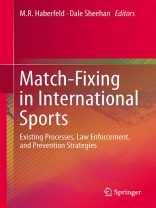Match –fixing has become a widespread international problem in recent years. It includes everything from bribery of players, to putting undue influences on the owners of the soccer clubs, managers, coaches and others who have the ability to affect the final scores. In addition, match-fixing spills over into the arena of illegal betting (in person and online), which creates a host of additional organized crime opportunities, including human trafficking, prostitution, drugs, extortion and even terrorism. This timely volume brings together international contributions with an aim is to increase awareness of the problems associated with match-fixing and the degree to which key agents in sport, particularly young people, are vulnerable. The contributions are based on INTERPOL’s Global Experts Meeting in Singapore, in November 2012, which brought together key speakers to discuss issues surrounding match-fixing and how to combat corruption in football through channels of education. The purposeof this meeting was to identify ways that academia can play a role in developing and implementing training modules and academic courses, including certification procedures, to prevent match-fixing and develop lines of study at all educational levels. This unique work reflects the gravity of the situation around the world together with possible solutions.
Table of Content
I. Corruption in Sport: Match Fixing Definitional and Operational Issues.- Introduction.- Match Fixing in Western Europe.- Match Fixing in Eastern Europe.- Corruption in Sports: An Argument for the Nodal Approach.- Regional Reflections: A Study of East Africa.- II. Preventing Match Fixing.- Facilitators and Responses to Match-Fixing: A Comparative Approach.- Which Factors Favor Betting Related Cheating in Sports?- Theoretical Model: A Case of Supply and Demand.- Compliance Mechanism as a Tool of Prevention?- III. Future: Where Do We Go From Here? – INTERPOL’s Response.- Way Forward: Law Enforcement- An Academic Paradigm.
About the author
M.R. Haberfeld is a Professor of Police Science in the Department of Law, Police Science and Criminal Justice Administration at John Jay College of Criminal Justice in New York City. Prior to coming to John Jay she served in Israeli Defense Forces, in a counter-terrorist unit, and left the army at rank of a Sergeant; she then joined the Israel National Police, and left the force at the rank of Lieutenant. She also worked for the U.S. Drug Enforcement Administration, in the New York Field Office, as a special consultant. She holds two Bachelor or Art degrees, two Master degrees, and a Ph.D. in Criminal Justice. Her main interests and expertise are in the area of police training and professional development, with particular emphasis on: police ethics, integrity, leadership, counter-terrorism and use of force in multicultural environments.












